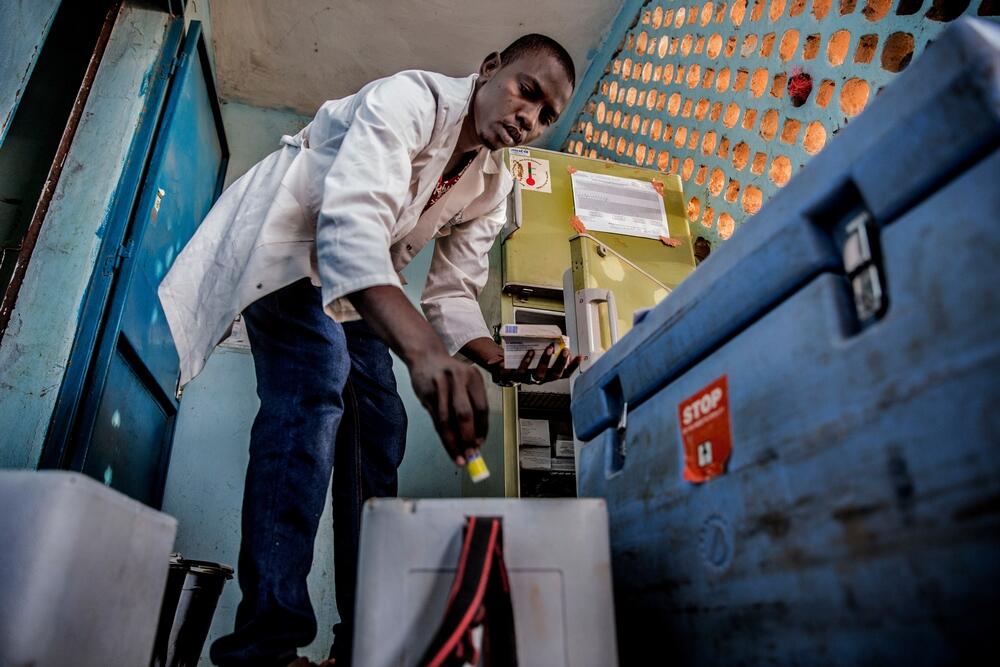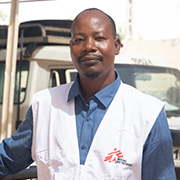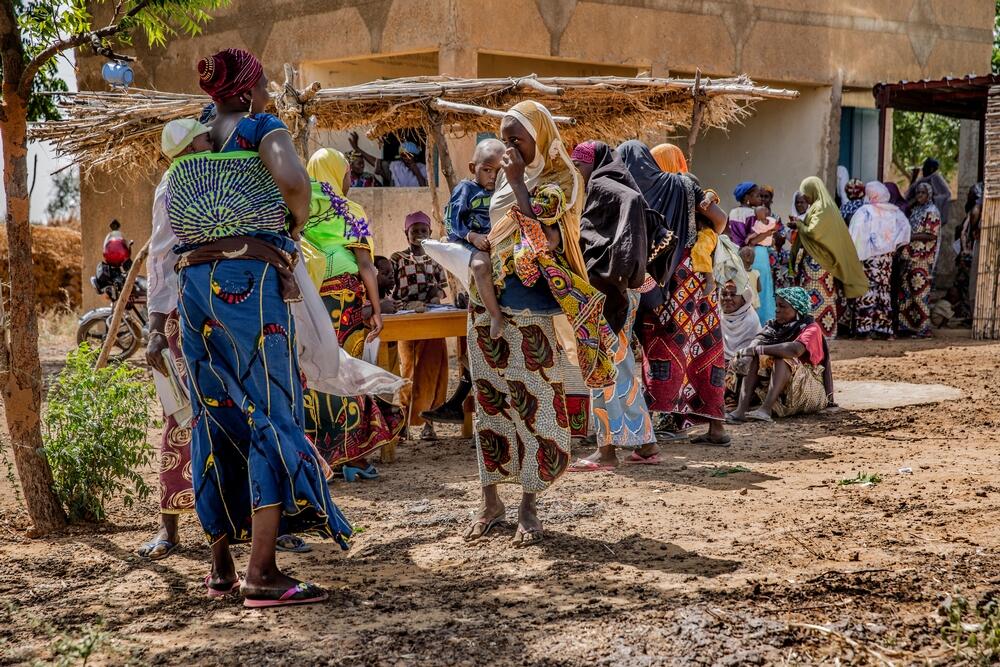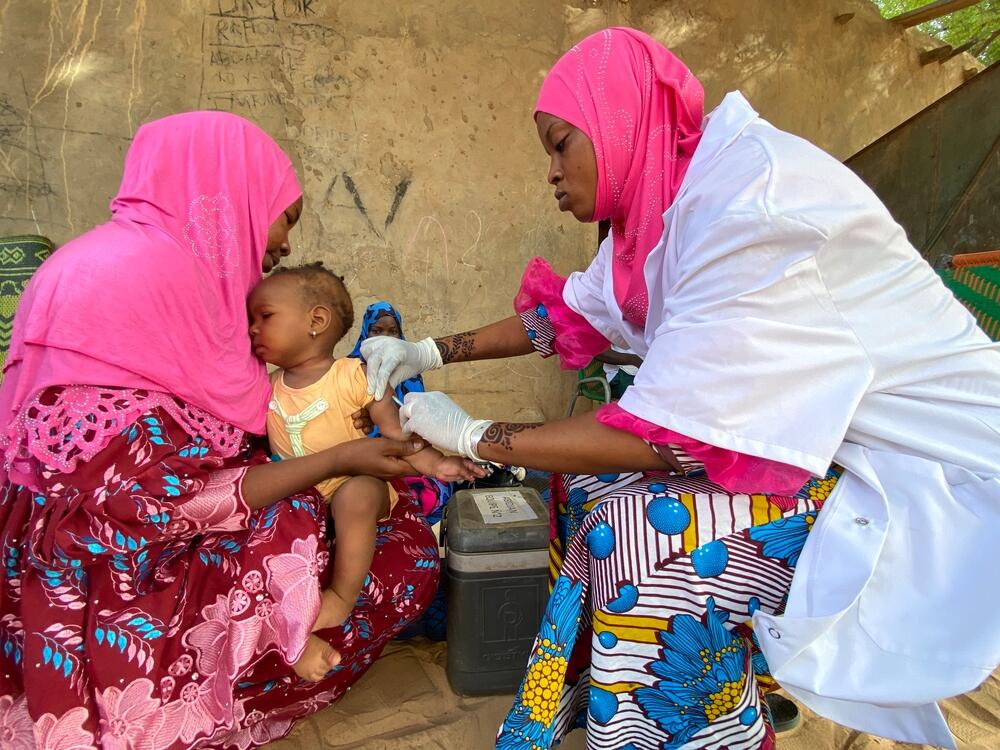Niger: How misinformation and climate change are threatening young lives
MSF doctor Maman Karsou reports from his hometown in Niger, where epidemics of measles and meningitis are being exacerbated by the global issues of COVID-19, climate change and misinformation.
As Médecins Sans Frontières / Doctors Without Borders (MSF), we deliver regular vaccination campaigns in countries all over the world depending on medical needs. I have worked on 12 vaccination campaigns myself.
However, this year’s campaign in Niger was full of challenges.
The first challenge we faced was to tackle the worrying decrease in vaccine coverage compared to previous years.
For example, in Niamey the capital of Niger, where I coordinated this campaign, not a single area had achieved a coverage rate of more than 85 percent against measles in 2020.
To put this into perspective, according to the World Health Organization, coverage should reach at least 95 percent to better protect people against measles. So, if this downward trend continues to worsen, it could lead to severe disease outbreaks in the coming years.
Dangerous rumours
This year, we also witnessed some confusion among communities regarding vaccination campaigns carried out by the Ministry of Public Health’s teams against COVID-19, and the catch-up vaccinations against measles that we’re delivering ourselves.
Unfortunately, this confusion led to a lower rate of local people taking part.
“There is also a reality that we can no longer ignore: climate change is undeniably impacting the rate at which epidemics occur”
In Niamey, as in Magaria, our teams have dealt with rumours and false information that have been circulating since last year around the coronavirus vaccine. However, this has had a significant influence on the more regular vaccination schedule.
People now have doubts about the vaccines given to them and this is arguably our biggest challenge.
I remember that in 2015, during the last major meningitis epidemic in Niger, people would go to the pharmacy to buy the vaccine themselves. Now, the same parents who bought this vaccine without hesitation in 2015, no longer trust it.
The bigger picture
The second challenge that must be addressed is the wider impact on the healthcare systems.
This year, for example, our teams faced a delay in acquiring vaccines against meningitis and measles due to a decrease in stock available in Niger.
This is because, since the start of the COVID-19 pandemic, we have seen a great mobilisation of funding for the development of vaccines against the coronavirus and for the hospital treatment of patients all over the world.
Yet, in countries that are more vulnerable to other epidemics, such as Niger, one emergency does not replace the other. An equitable distribution of funds must therefore be secured in order to avoid a deterioration of routine healthcare in the country.

Help us prepare for the next emergency
Beyond these challenges directly linked to COVID-19, there is also a reality that we can no longer ignore: climate change is undeniably impacting the rate at which epidemics occur.
For example, during the dry season, it’s well known that heavy dust in regions like the Sahel and the Sahara plays a role in the spread of meningitis, which is an airborne bacterium.
Such epidemics tend to go away on their own when the rainy season begins, however with a changing climate, the rainfall has been erratic in Niamey and Magaria.
As a result, we have seen that cases of meningitis and measles have remained high.
Preparing for the next epidemic
While the world still grapples with COVID-19, we cannot let the efforts that have been made over years of fighting other epidemics go in vain.
In Niger, the epidemiological situation does not allow us to let routine vaccination activities weaken and we can’t wait for yet another epidemic to launch a new vaccination campaign.
Meningitis and measles are known diseases. They are not new and communities themselves have a very important role to play in the fight against these epidemics.
But, it's with the help of everyone that we will succeed in eradicating these diseases.
As an emergency medical organisation, we’ll continue to respond to these rampant and recurring epidemics in Niger as in other countries of the world. Each time, we rely on the previous experiences to better prepare for the next one.
We are working on improving epidemiological surveillance, as well as our crucial ability to mobilise rapid response teams and strengthen the healthcare systems we already support.
However, we need to step up our efforts in education and community engagement, especially in places where those rumours that dissuade people from being vaccinated are widespread.
Correcting this is the responsibility of everyone: communities, authorities, medical and humanitarian organisations and donor organisations.
Our vaccination campaign in Niger
In three and a half months, MSF vaccinated more than 600,000 children against measles and meningitis in Niamey and in Magaria, working alongside the Ministry of Public Health.
Since the beginning of the year, our teams have also supported responses to epidemics in the regions of Dosso, Tahoua, Agadez, Tillabéry, Diffa, Zinder and Niamey.
MSF and the climate emergency
The climate emergency is also a healthcare emergency. When extreme weather events occur, it is the most vulnerable people who suffer the most.
This crisis isn’t only about the catastrophic cyclones and typhoons that hit the headlines. This is about the spread of deadly disease that can follow. The increasing risk of drought and famine. Of rising water levels. Desertification. The mass displacement of people from their homes…
In every way, climate change is a massive humanitarian emergency.



